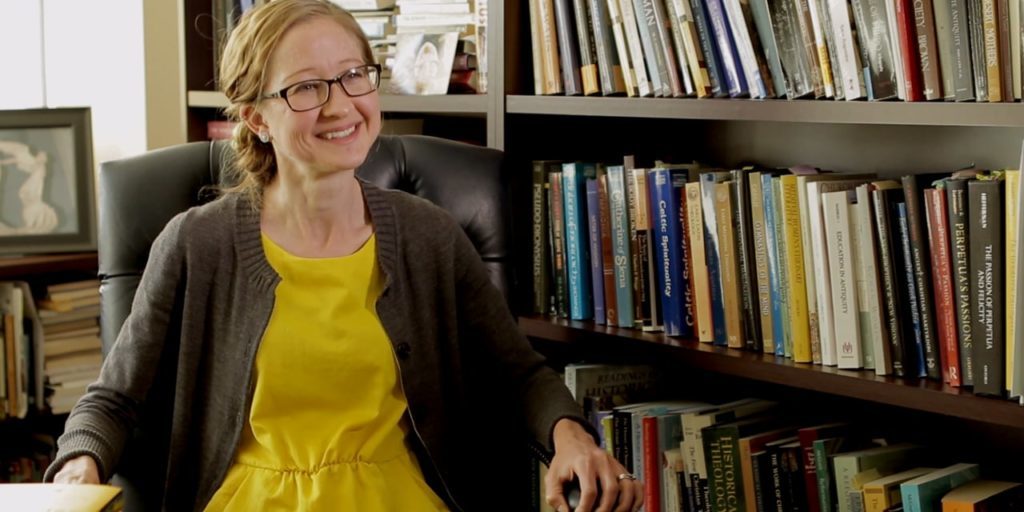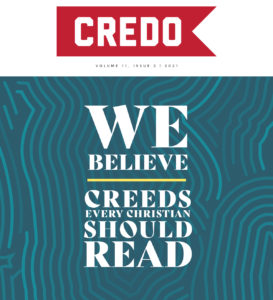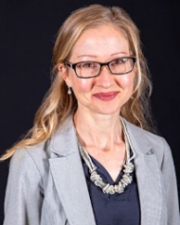
10 Questions with Megan DeVore
T he latest issue of Credo Magazine focuses on the creeds of the Christian Faith. The following is an excerpt from one of the issue’s featured interviews with Megan DeVore conducted by Samuel Parkison. Dr. DeVore is Associate Professor of Church History and Early Christian Studies at Colorado Christian University.
he latest issue of Credo Magazine focuses on the creeds of the Christian Faith. The following is an excerpt from one of the issue’s featured interviews with Megan DeVore conducted by Samuel Parkison. Dr. DeVore is Associate Professor of Church History and Early Christian Studies at Colorado Christian University.
Can you tell us a little bit about your journey into academia?
I’ve been particularly fascinated by history, literature, and languages for as long as I can remember. A love for learning combined with a passion for sharing, which compelled me toward teaching, researching, and writing. In my first year of college, I charted a path be a high school humanities teacher. While my journey didn’t remain there, I’ve always been grateful for the courses I took in education and instruction. My academic venture deepened and continued (and continued, across programs as well as continents!) from there. Academia isn’t easy – it’s both profoundly good and deeply taxing, like most worthwhile things. Yet I have to admit that it seems there is something deep in my bones that simply was and is drawn to this venture, in each of life’s seasons, joys, and challenges.
Of all the periods of church history to settle on, why did you land in the early centuries with the patristics?
It was an unfolding process. Some undergrad experience at Oxford included tutorials in Medieval history as well as lectures from prominent Eastern Orthodox theologians. Those were my first exposures to the richness of early Trinitarian reflection, as well as to historic Christian art and architecture as an expression of theological belief and practices. I was irrevocably enthralled – not merely by fields of study, but by the Christian faith that was more deeply rooted and compellingly multifaceted than I had ever realized. I wanted to specialize immediately and exclusively in theology, but then a professor back in Colorado introduced to me to Eusebius and suggested I begin the journey into theology with MA work in Classics. He told me I would never regret depth in the historical, cultural, linguistic, material, and literary contexts of Christianity. He advised me that the academic journey was long, and my path could move in any number of directions from such a solid foundation. He was right. Classics gave both rich preparation for and work in the Early Christian centuries; it also expanded my teaching portfolio. I’m immensely grateful for the various courses and phenomenal professors who gave me opportunity to delve deeply not only into the culture of the Greco-Roman world and Late Antiquity, but specifically also into the early Christian eras and authors. A class in hagiography, then another in early Christian material culture, finalized it for me: ever since, the Patristic era has held my primary passion. This was the impetus for my next step into a theology PhD, focusing on this period.Personally, I continue to find Patristic era both grounding and dazzling. Click To Tweet
Academically, the majority of my current projects focus on the venues that early Christian leaders used for the affirmation and communication of orthodoxy in the second through fourth centuries. Personally, I continue to find Patristic era both grounding and dazzling. It displays a profound commitment to and rich reading of the Scriptures, a multifaceted creativity and deep humility, a sustained articulation of anchored belief in various genres and venues (from hymns and sermons to polemical tomes, from visual art to poetry and creative fiction), myriad examples of theologically-oriented practices in the contexts of communities spread far and wide, and an unremitting awareness of the implications of the nature of the Triune God and of the incarnation… to name just a few captivating aspects! I should add that none of this “ends” with the unfolding of the Medieval era. Far from it. The Patristic era forges tools useful for and engaged (to various extents, and then often also recovered!) by every generation since, whether or not we are aware of it. I do think we are becoming ever more attentive to that reality.
Many people tend to think about history in an isolated and disconnected fashion, as if history is a compilation of one random event after another. This can often lead to an ambivalence toward the subject, wherein people treat the stories of history as interesting anecdotes about irrelevant figures who are so distant and detached they might as well be fictional. You, however, seem to depict history differently. As a Christian educator, for example, you have been known to call Church History our “family history.” Why is this distinction so important?
You’re right: in general, there is an amnesia manifest in our culture today. Christians haven’t been immune to it. I don’t think it’s willful, but it certainly is myopic and debilitating. The remedy to our loss of history isn’t just to relay more content, however. We have to cast an informed and formational vision of wonder and connection – the ‘why’ of history. With the ‘why’ must come a very intentional ‘how’, because doing history with irresponsible gusto isn’t helpful, either! When we engage our past in a way that doesn’t merely glance at isolated scenarios, nor misguidedly create idealized ‘lone ranger’ heroes and institutional villains, we can became aware of a few things. First, we can view with empathy both the brokenness and the beauty in the history of the Church. Then, we can began to see our own story as grafted into the Church’s story – our ancestry, as it were, as complicatedly messy, heartbreaking, and full of redemption as our own stories. We see the many connections, the many prayers, and the many toils of those who have come before us, as we see that changes in the story actually take a great amount of time and preparation to unfold. This gives us the patience and the hope to wholeheartedly confess with Paul that Christ “is before all things, and in Him all things hold together” (Col. 1:17). All things means all things, including the broken and beautiful story of the Church. The past reminds us that hope for the church is not lost to the present chaos, that the activity of our Triune God is transpiring always, unto this very day, and that we can walk forward equipped, companioned, and convicted.The past reminds us that hope for the church is not lost to the present chaos, that the activity of our Triune God is transpiring always, unto this very day, and that we can walk forward equipped, companioned, and convicted. Click To Tweet
Judging from the variety of classes you teach and subjects you’re interested in, it seems like you’ve had the opportunity to contemplate how various disciplines interrelate. For example, how do you think one’s philosophy impacts one’s view of history, and vice versa?
It is as though everything is a tapestry, with ‘organic’ threads of interdisciplinary connection and, ultimately, implications for action. When I commit myself to the authority of the Triune God, who reveals Himself and His covenantal work in the Scripture and whose redemptive action or ‘economy’ (as Irenaeus would say) continues to be evident in the world He created, and to the Great Commands and Commission to which God’s followers are directed and equipped, that is going to wholly affect how I view and undertake my field of discipline as well as my vocation. The classes I teach could seem varied at first glance – from History of Christianity survey courses to Patristic Theology seminars, to Canon Formation, Latin, History of the Roman Empire, Deuterocanonical Literature, and an introduction to the history of philosophical thought, for example – but they are interconnected in ways like content or method, and they always involve both informational and formational aspects. Actually, I wish I was more interdisciplinary: I’d love to understand more about the stars as well as physics, or to assist my grade-school children with their math, or to troubleshoot my laptop when it malfunctions… but alas.
On this note, what advice would you give to aspiring scholars who struggle with settling on an emphasis to research (i.e., students who are interested in everything)?
Firstly, don’t be afraid to carefully and persistently seek out connections. Even if an interdisciplinary question doesn’t seem to have been pursued in your educational background, there are likely others in the past and present who have undertaken a related pursuit and can serve as resources and companions. Secondly, partake in a well-rounded education (i.e., one that values the liberal arts and interdisciplinary approaches, as well as intellectual fidelity and expertise) while remaining committed to patience and full presence. In a world that champions velocity, immediate intricate specialization, and a thorough pragmatism in which every step is merely a “means” to ever-unfolding material “ends” (complete the class, so that you can get a degree, so that you can get a job, so that you can… and so on – a viciously hopeless chimera of false ‘fulfillment’ and ‘achievement’ that has led to so much devastation today), you will find that you will need to push against such ‘norms’. Be fully engaged, give yourself time and mental space to think deeply and converse well with others, and find experienced mentors who can listen fully, pray with you, and provide honest insights on what paths could be useful to pursue, and what might be tangled webs or dead-ends.

